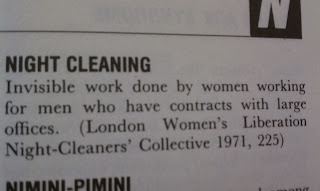I want to do some thinking in this weekend’s post towards an
essay I am writing about the gendered discourses of power at work around, in
and through preschool teachers, which shape and are shaped by early childhood
teaching as feminine labor. I am going
to try to brainstorm my way through connections to Foucault (via Weedon, 1997
and Bartky, 1992 for now), language as representation (Hall, 1997), and
movements in gender and language studies to understand gender as working
through multiple discourses, which particularly act to erase multiplicity and
highlight difference (Baker, 2008). Some of my notes on these are pictured
here.
From these I want to see how well
I can get this to work with the research idea I have been playing with about
teacher labor in preschool.
So where are the discourses of preschool labor located? How do I recognize them? One publicly available place I have been
thinking about is in curriculum materials, including the ways that teachers,
administrators, companies, district officials talk about, embody and act on and
around the curriculum. The OWL curriculum and surrounding sites of dialogue a packaged set of materials,
resources, teachers manuals, and pacing guides used in many public
preschools in the large urban area I am
working in, is one such set of texts.
Thinking about discourses, language, power, representation,
and gender, some questions I may ask to build my lens for reading the OWL are:
What is the common sense relayed by OWL curriculum and
surrounding discourse? And how
particularly is this stuff represented?
What is erased? (with my interests, particularly in terms of
labor)
What languages are used or associated with the curriculum (language
of teacher’s manual, language of materials, language of authorized children’s
books) (… hmmm… language doesn’t feel like quite the right word, but I think
this is the way Stuart Hall uses it…?)
Whose meanings about preschool, teachers, labor are represented
in OWL?
How are/might these meanings be countered, negotiated and/or
sustained through activities working through, around and within the curriculum
discourse?
How does the curriculum attempt to control the bodies of
teachers?
In what ways is the discourse gendered?
What is the relationship between the discourse and power? What are the material implications for
preschool teachers?
How are my roles and authority as writer, researcher,
student, early childhood teacher, mother, feminist, college lecturer implicit
in the particular storied answers to these questions?
References
Baker, P. (2008). Sexed
texts: Language, gender and sexuality.
London: Equinox.
Bartky, S. (1992). Foucault,
femininity and the modernization of patriarchal power. In J.P. Sterba, J. A. Kourany, R. Tong (Eds.). Feminist philosophies: Problems, theories,
and applications, (pp. 103 – 188). Edgewood Cliffs, New Jersey:
Prentice-Hall.
Hall, S. (1997). Representation:
Cultural representation and signifying practice. Sage.
Weedon, C. (1997). Feminist
practice and postructural theory. Malden, Ma: Blackwell.













